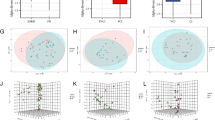Abstract
Background
Diabetes is associated with a high risk of developing cognitive impairment, but the underlying mechanism remains unclear. Recent studies have found that gut microbiota may be involved in the progression of diabetes-associated cognitive impairment.
Aims
To analyze the diversity of gut microbiota in type 2 diabetes with or without cognitive impairment
Methods
16S rRNA sequencing was used to detect the gut microbiota composition in 154 type 2 diabetes (T2DM) subjects
Results
Among 154 elderly T2DM participants included in our study, 73 with normal and 81 with impaired cognition. Lower levels of hemoglobin and HDL were observed in subjects with cognitive impairment. Patients with cognitive impairment had a lower abundance of Tenericutes. Comparison at the genus level revealed that T2DM patients with cognitive impairment had a decreased abundance of Bifidobacterium and unranked-RF39 and an increased abundance of Peptococcus and unranked-Leuconostocaceae. Additionally, the relative abundance of Veillonella and Pediococcus were decreased in subjects with cognitive impairment. Furthermore, the relative abundance of 7 sub-functions was significantly changed in the group with cognitive impairment. Calcium signaling pathways and the Renin-angiotensin system were upregulated in the cognitive impairment group while GnRH signaling, Fc gamma R-mediated phagocytosis, endocytosis, isoflavonoid biosynthesis, and cytochrome P450 were deregulated.
Conclusion
Bifidobacterium may be associated with cognition in T2DM. Calcium signaling and renin-angiotensin system were shown to be associated with diabetes-associated cognitive impairment through gut microbiota.







Similar content being viewed by others
References
Ferri CP, Prince M, Brayne C et al (2005) Alzheimer’s Disease International. Global prevalence of dementia: a Delphi consensus study. Lancet 366:2112–2117
Xu Y, Zhou H, Zhu Q (2017) The impact of microbiota-gut-brain axis on diabetic cognition impairment. Front Aging Neurosci 9:106
Rhee SH, Pothoulakis C, Mayer EA (2009) Principles and clinical implications of the brain-gut-enteric microbiota axis. Nat Rev Gastroenterol Hepatol 6:306–314
Bienenstock J, Kunze W, Forsythe P (2015) Microbiota and the gut-brain axis. Nutr Rev 73(Suppl 1):28–31
Finegold SM, Dowd SE, Gontcharova V et al (2010) Pyrosequencing study of fecal microflora of autistic and control children. Anaerobe 16:444–453
Lim JS, Lim MY, Choi Y et al (2017) Modeling environmental risk factors of autism in mice induces IBD-related gut microbial dysbiosis and hyperserotonemia. Mol Brain 10:14
Naseribafrouei A, Hestad K, Avershina E et al (2014) Correlation between the human fecal microbiota and depression. Neurogastroenterol Motil 26:1155–1162
Santos-Eggimann B, Karmaniola A, Seematter-Bagnoud L et al (2008) The Lausanne cohort Lc65+: a population-based prospective study of the manifestations, determinants and outcomes of frailty. BMC Geriatr 8:20–30
Kato K, Odamaki T, Mitsuyama E et al (2017) Age-related changes in the composition of gut bifidobacterium species. Curr Microbiol 74:987–995
Blasco G, Moreno-Navarrete JM, Rivero M et al (2017) The gut metagenome changes in parallel to waist circumference, brain iron deposition, and cognitive function. J Clin Endocrinol Metab 102:2962–2973
Pinero F, Vazquez M, Bare P et al (2019) A different gut microbiome linked to inflammation found in cirrhotic patients with and without hepatocellular carcinoma. Ann Hepatol 18:480–487
Yun Y, Kim HN, Lee EJ et al (2019) Fecal and blood microbiota profiles and presence of nonalcoholic fatty liver disease in obese versus lean subjects. PLoS ONE 14:e0213692
Golubeva AV, Crampton S, Desbonnet L et al (2015) Prenatal stress-induced alterations in major physiological systems correlate with gut microbiota composition in adulthood. Psychoneuroendocrinology 60:58–74
Bajaj JS, Hylemon PB, Ridlon JM et al (2012) Colonic mucosal microbiome differs from stool microbiome in cirrhosis and hepatic encephalopathy and is linked to cognition and inflammation. Am J Physiol Gastrointest Liver Physiol 303:G675–685
Kaji K, Takaya H, Saikawa S et al (2017) Rifaximin ameliorates hepatic encephalopathy and endotoxemia without affecting the gut microbiome diversity. World J Gastroenterol 23:8355–8366
Hamezah HS, Durani LW, Yanagisawa D et al (2018) Proteome profiling in the hippocampus, medial prefrontal cortex, and striatum of aging rat. Exp Gerontol 111:53–64
Kehoe PG (2018) The coming of age of the angiotensin hypothesis in alzheimer's disease: progress toward disease prevention and treatment. J Alzheimers Dis 62:1443–1466
Hough D, Robinson JE, Bellingham M et al (2019) Peripubertal GnRH and testosterone co-treatment leads to increased familiarity preferences in male sheep. Psychoneuroendocrinology 108:70–77
Ahmad S, Bannister C, van der Lee SJ et al (2018) Disentangling the biological pathways involved in early features of Alzheimer's disease in the Rotterdam Study. Alzheimers Dement 14:848–857
Ladinsky MS, Araujo LP, Zhang X et al (2019) Endocytosis of commensal antigens by intestinal epithelial cells regulates mucosal T cell homeostasis. Science 2019:363
Rajput MS, Sarkar PD, Nirmal NP (2017) Inhibition of DPP-4 activity and neuronal atrophy with genistein attenuates neurological deficits induced by transient global cerebral ischemia and reperfusion in streptozotocin-induced diabetic mice. Inflammation 40:623–635
Fu ZD, Cui JY (2017) Remote sensing between liver and intestine: importance of microbial metabolites. Curr Pharmacol Rep 3:101–113
Acknowledgements
Funded by the Wuxi Commission of Public Health and Family Planning of China (T201629), Wuxi people’s hospital (RKA201725, RKB 201714, RKA201811).
Author information
Authors and Affiliations
Contributions
Conceptualization: [KH and GL]; methodology: [YY, ZW, WL, JZ and MP]; formal analysis and investigation: [YZ, SL, BW, BZ, JY, SG and XC]; writing—original draft preparation: [YZ]; writing—review and editing: [GL]; funding acquisition: [KH]; resources: [ZY]; supervision: [KH and ZY].
Corresponding authors
Ethics declarations
Conflict of interest
The authors declare no conflict of interest.
Statement of human and animal rights
The present study was approved by the Ethics Committee of the Nanjing Medical University affiliated Wuxi People’s Hospital, China.
Informed consent
The participants or their legal guardians provided written informed content to participate in our study.
Additional information
Publisher's Note
Springer Nature remains neutral with regard to jurisdictional claims in published maps and institutional affiliations.
Rights and permissions
About this article
Cite this article
Zhang, Y., Lu, S., Yang, Y. et al. The diversity of gut microbiota in type 2 diabetes with or without cognitive impairment. Aging Clin Exp Res 33, 589–601 (2021). https://doi.org/10.1007/s40520-020-01553-9
Received:
Accepted:
Published:
Issue Date:
DOI: https://doi.org/10.1007/s40520-020-01553-9




